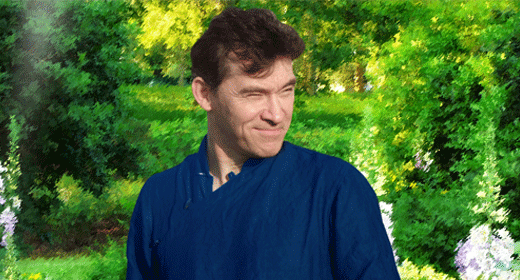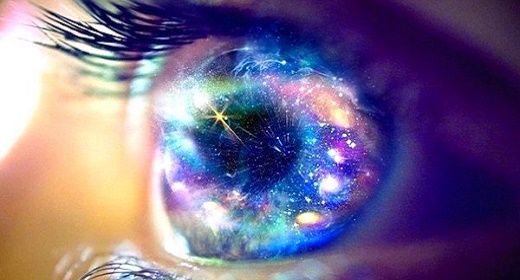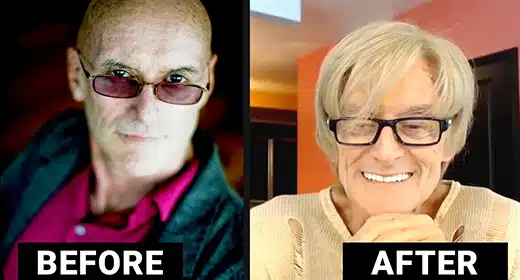Donna Quesada: Well, Ken, I want to thank you for your time. It’s just an honor and a pleasure to be able to spend this time with you.
Ken Wilber: Thank you. It’s a delight to be here.
DONNA: Thank you. I don’t know if you’ve seen any of our past interviews, but we love to start with the question of what it means to Awaken. If you’ll indulge me, I’d love to have you share your thoughts on that.
KEN: Sure. Awaken is a term, like enlightenment, that really does have a reference to when we sleep and we’re out…we’re dreaming and we’re not in touch with reality. Then we wake up and it’s all of a sudden, the whole world comes into view and we’re hearing and smelling and tasting and seeing and touching, and we’re awakened from the dream state.
Turns out that we can have another type of awakening just as real, as a matter of fact. More real than when we wake up from a deep sleep. That’s why it’s called “enlightenment” or “awakening” or “waking up.” What that really means is that every person has at least two selves. We have our relative self, our small self, and our small mind, called “ego.”Then we have what Suzuki Roshi used to call a “big man” or “big self” for the Vedanta Hindus.
It’s the Atman, Brahman. The Atman, the big self… that’s one with Brahman or one with absolute reality. That’s what we mean when we say “awakened.” We drop our identity with our small self and awaken to this larger absolute identity with our big self, our true mind, our absolute reality. That changes people’s lives profoundly and forever. It’s of course the goal of all mystical traditions, not just Buddhism with its actual Satori or enlightenment experience, although that’s a very good example of an awakening experience. But Taoism, Zen Buddhism, Christian mysticism, Kabbalah…Judaism… religious scholars agree that all of those mystical religions have as their goal, an enlightenment or an awakening or a waking up experience. That’s exactly how you experience it. You’re just going along, living out your ordinary day. Maybe you’re taking a walk through the woods or something.
Then all of a sudden, now you’re one with the entire forest. You’re one with every tree that’s arising, you’re one with the entire universe. Because that’s what your big self is. It’s the self of the universe. When you awaken to that big self, you awaken to your identity with the entire cosmos. So it’s called things like “cosmic consciousness.” Or “unity awareness,”or “ultimate absolute awakening.” That’s a very good goal to have for your ordinary life, to take up some meditative practice or some contemplative prayer or some mystical practice and aim for a true awakening, a true enlightenment, a true waking up experience because your life will never be the same since then.
DONNA: Full disclosure, I was delighted to learn that your entryway into mystical thought was through Zen, and that was my portal, as well. I fell in love with Alan Watts at first, and it went deeper into the rabbit hole from there.
KEN: When I found out about awakening or enlightenment, it was actually through reading the books of D.T. Suzuki. He wrote books like Essays and Zen Buddhism, a big, three volume work. I read that when I was 13 or 14, and I kept running across words that I’d never heard, like Satori. And Satori, of course, is Japanese for awakening or enlightenment or awakening up experience.
DONNA: In a sudden sense.
KEN: Yeah. I had to have whatever that Satori was. I had to have it. What struck me about Zen is that of all of the world’s mystical traditions, that’s specifically what they aim for. You must have a Satori to get Zen Buddhism, and if you don’t have a Satori, you don’t have Zen. So, I immediately started contacting every Zen master who’d moved to America that I could find. This was in the 60s, and this was the whole psychedelic revolution and consciousness revolution and all of that. There were actually a fair number of Zen masters who came to America for that reason. I contacted all of them and because I had read Suzuki’s essays and Zen Buddhism, I knew that the first sutra that the first six Zen masters passed to their successors was the Lankavatara Sutra.
It’s a terrific sutra. It talks specifically about what this waking up is, how you get it, and how the universe is created around it. I knew that Bodhidharma passed it to his successor, who passed it to his successor, who passed it to his successor. Every Zen master that I wrote… I said, “I’ll show you how serious I am.” Let me explain the Lankavatara Sutra. I would write four or five pages explaining the Lankavatara Sutra because I thought that would impress them. That’ll show them how serious I am. One of them actually bought it. I asked for a Zen koan and he sent me Mu, a very famous Japanese koan.
DONNA: I know the koan, yes.
KEN: Joshu said, “Mu,” which is Japanese for “no,” but every Buddhist knows that every sentient being including a dog, has a Buddha nature. So why did Joshu scream, “no?” That was it. What you do is you just focus on Mu and you say Mu over and over until you become one with Mu. Then you have an awakening experience… a Satori.
It was Aron Roshi from New York, and he sent me a three-step process for studying Mu. It was like when I concentrated on Mu, I was only aware of Mu. The second step is when I concentrate on Mu, not, I am aware of Mu, just Mu. The third one is when I don’t concentrate on Mu, there is only Mu. I went through those steps and it took me about two years. I finally got to the second step, which was the awakening part of it. I wrote him back about it and he passed me.
DONNA: Well, I’m laughing because my experience was similar. No one cared how many books I read. All they cared about was can you sit and face the wall for eight hours? Which of course was torture. I thought these people are crazy, get me out of here. Until finally the ego gives up and something happens. But just to take a couple of steps back, the business of Satori is instant, but it doesn’t always have to be instant… Does it? Waking up can come in stages?
KEN: Yes. It certainly can.
DONNA: Can you speak to that… if you would?
KEN: Yeah. There’s actually a series of famous lithographs called the Ten Zen Ox-Herding Pictures. It’s 10 stages of development that you go through on the way to full enlightenment. The eighth stage is this typical Satori stage. When it’s drawn, it’s just an empty circle. That’s all. In the first seven stages, you see a farmer who spots an ox, and the ox is of course his true mind. He sets out running after the ox and he gets closer and closer and it ditches him and he gets closer again and it ditches him and then finally, “Pow!” He becomes one with him. So it’s just an empty circle. That’s still the eighth stage.
In all of these previous seven stages, there are minor awakening experiences, but it’s not a full-blown Satori. It’s not even the eighth stage, the empty circle, the emptiness stage. Then after the eighth stage is the ninth stage, where you follow the ox into the marketplace, which is returning to your everyday life. Then the 10th stage is just being in the marketplace with empty hands, open hands. That means you’re completely open to reality. So those are 10 stages of development.
DONNA: Before enlightenment, carrying wood and water, and after enlightenment, carrying wood and water.
KEN: Yeah. Right.
DONNA: So the idea is that we’re impressed with ourselves at first and we still have that ego around it. Then at some point, you go even further and we just carry on like normal.
KEN: Right.
DONNA: Only something has changed, but you can’t quite say what it is.
KEN: Right. Yeah. That Ten Zen Ox-Herding Pictures is a return to ordinary life, but it’s not really ordinary. It’s completely changed. I’m completely changed, but I still go into the marketplace with open hands and do my shopping, do my purchasing… doing my interactions with the world. That’s a real Zen.
DONNA: When you started to have these experiences, you passed a koan (enigmatic Zen question)?
KEN: Yeah.
DONNA: How did it impact your life? How did you see things in a new way? How did you regard people? How did your relationships shift?
KEN: Right. I’m going to give you a little exercise that may or may not work, and it may help explain or hurt it. We’ll find out. This is taken from a man named Douglas Harding, who’s from the London Buddhist Society. He wrote a facetious tongue-in-cheek book called On Having No Head. Now of course, what we want… the whole point of a Zen Satori is, you become one with a non-dual reality. So subject and object become one. So, you’re no longer looking at the flock of birds flying by. You are the flock of birds. You no longer see the mountain. You are the mountain. You no longer walk on the earth. You are the earth. It’s really just… you’re absolutely one with it. Douglas Hardings’s On Having No Head was a simple almost comical way that he used to show everybody that they already have this non-dual unity. He would do that by saying, in essence, notice that you can’t see your head. You can look at any of your body parts, you can see your hands, you can see your feet, you can see your legs, you can see your torso, but you can’t see your head. It’s just not there. If you try to see it, all you’ll see are these two fleshy bobs that are your nose.
DONNA: Which is strange, I always thought… there’s something strange about that, when you can see your nose!
KEN: What’s strange about it is, if you look for where your head is, and let’s say you’re looking at this computer screen and you’re looking for where to sense your head, all you’ll feel is this computer screen. It’s sitting right where you thought your head was. It’s sitting right on top of your shoulders, and you are one with this computer screen. There’s absolutely no difference between the subject in here and the object out there because the object out there is sitting right here, right where you thought your head was. That’s on having no head.
We always don’t have a head because we’re always one with the entire world of objects. That’s one with our awareness… it’s right where our head used to be. It’s sitting on top of our shoulders. That’s one way of talking about how your life changes, is you no longer are looking at a separate world out there. You’re literally looking at what you are. You’re one with the entire object world that you thought was out there, but it’s actually sitting right where you thought your head was.
DONNA: You’re it.
KEN: You’re it. That explains a lot of Zen koans about the sound of one hand clapping and those types of things where you realize that you are every object that you’re aware of. It’s always sitting right here, right where you thought your head was. There’s no space between you the subject, and you and the object, out there. The object is one with your subject.
DONNA: What does that mean for our relationships though? Does it imply…
KEN: It’s very interesting because first of all, you feel very close to the person because they’re actually one with you. If I had a girlfriend and then I would kiss her, she’s already there and I’m just going through the motions. You feel that intimacy with the entire world around you, you feel that you’re just one with everything. If you drive to the grocery store, you get in the car, you’re one with a car. You start driving the car, you’re one with the road. You get out the car, you get out, you walk into the grocery store, you’re one with every object that’s for sale. You’re one with all of the groceries and all of the goods. It just gives you that very sense of closeness, of intimacy with the entire world. That of course removes any sense of alienation that you have, or almost any sense of depression that you would have because you’re so close to everything and everything is so giving of itself to you.
That just is a major mental change, particularly when you realize that all of these objects are sitting right where your mind was, right where your head was. That’s just a very real felt unity and it’s a very intimate unity, and it makes you feel very close and very loving, is the word. One with everything you’re aware of… you’re in love with it because you’re one with it. To be in love with something is to be one with it. Even when we say “I love ice cream,” we mean “I love eating ice cream and becoming literally one with it.” But that’s the feeling this non-dual reality gives you, is a sense of overwhelming love for everything that you’re aware of because you’re one with everything you’re looking at.
DONNA: There’s no room for the fear and the anxiety and all of the things that we suffer from as a society.
KEN: Those tend to die down. Because fear is usually of some object. If an animal’s chasing you or something like that, or a person pulls a gun on you or something like that. But what actually happens if a person pulls a gun on you and they don’t actually shoot you… what you’re feeling is the oneness with this gun and the oneness with the person that’s pulling the gun on you. You really don’t feel fear. Now if they actually shoot you in the leg or something like that, then of course you might feel some fear because wait a minute, “they just shot me and they could shoot me and kill me.” But that’s a deduction that you have to make. It’s not an immediate fear reaction that you have because you’re one with the person. You love the person, you have a loving intimacy with them.
It doesn’t strike you as somebody who’s going to shoot you and kill you, like I say, unless they actually shoot you. Then you start to deduce, wait a minute, “they could actually shoot me.” But you have to deduce it. It’s not something that comes automatically. So fear tends to die down. The same with anxiety, whatever you’re afraid of, it might be public speaking, but when you get up in front of the public this time, you’re one with the entire audience and you feel intimately loving… occurring between you. Anxiety just doesn’t tend to arise. These are all things that you notice in your life as you go on living in a state of non-dual unity.
Read and Watch Part 2 Here: Awaken Interviews Ken Wilber Pt2 – Not I, but Christ liveth In Me
Read and Watch Pt 3 Here: Awaken Interviews Ken Wilber Pt 3 – Waking Up Is Just Not Enough, We Have to Grow Up
Read and Watch Part 4 Here: Awaken Interviews Ken Wilber Pt 4 – Guided Meditation into Witnessing Awareness
Read and Watch Part 5 Here: Awaken Interviews Ken Wilber Pt 5 – Finding Radical Wholeness
Read and Watch Part 6 Here: Awaken Interviews Ken Wilber Pt 6 -You Can Lose Your Fear In Fifteen Minutes










































